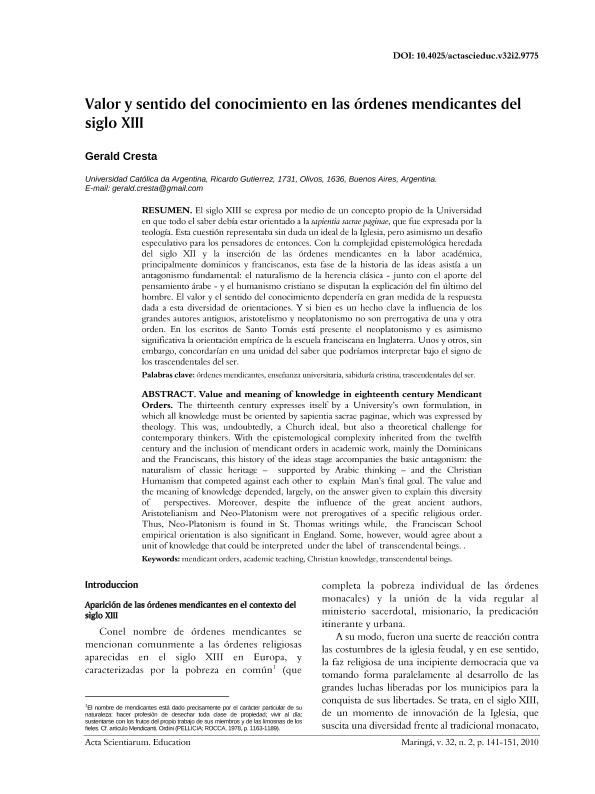Mostrar el registro sencillo del ítem
dc.contributor.author
Cresta, Norberto Gerald

dc.date.available
2023-03-21T22:40:31Z
dc.date.issued
2010-12
dc.identifier.citation
Cresta, Norberto Gerald; Valor y sentido del conocimiento en las Ordenes Mendicantes del Siglo XIII; Universidade Estadual de Maringá; Acta Scientiarum: Education; 32; 2; 12-2010; 141-151
dc.identifier.issn
2178-5198
dc.identifier.uri
http://hdl.handle.net/11336/191296
dc.description.abstract
El Siglo XIII se expresa por medio de un concepto propio de la Universidad en que todo el saber debía estar orientado a la sapientia sacrae paginae, que fue expresada por la teología. Esta cuestión representaba sin duda un ideal de la Iglesia, pero asimismo un desafío especulativo para los pensadores de entonces. Con la complejidad epistemológica heredada del siglo XII y la inserción de las órdenes mendicantes en la labor académica, principalmente dominicos y franciscanos, esta fase de la historia de las ideas asistía a un antagonismo fundamental: el naturalismo de la herencia clásica -junto con el aporte del pensamiento árabe- y el humanismo cristiano se disputan la explicación del fin último del hombre. El valor y el sentido del conocimiento dependería en gran medida de la respuesta dada a esta diversidad de orientaciones. Y si bien es un hecho clave la influencia de los grandes autores antiguos, aristotelismo y neoplatonismo no son prerrogativa de una y otra orden. En los escritos de Santo Tomás está presente el neoplatonismo y es asimismo significativa la orientación empírica de la escuela franciscana en Inglaterra. Unos y otros, sin embargo, concordarían en una unidad del saber que podríamos interpretar bajo el signo de los trascendentales del ser.
dc.description.abstract
The thirteenth century expresses itself by a University’s own formulation, in which all knowledge must be oriented by sapientia sacrae paginae, which was expressed by theology. This was, undoubtedly, a Church ideal, but also a theoretical challenge for contemporary thinkers. With the epistemological complexity inherited from the twelfth century and the inclusion of mendicant orders in academic work, mainly the Dominicans and the Franciscans, this history of the ideas stage accompanies the basic antagonism: the naturalism of classic heritage – supported by Arabic thinking – and the Christian Humanism that competed against each other to explain Man’s final goal. The value and the meaning of knowledge depended, largely, on the answer given to explain this diversity of perspectives. Moreover, despite the influence of the great ancient authors, Aristotelianism and Neo-Platonism were not prerogatives of a specific religious order. Thus, Neo-Platonism is found in St. Thomas writings while, the Franciscan School empirical orientation is also significant in England. Some, however, would agree about a unit of knowledge that could be interpreted under the label of transcendental beings.
dc.format
application/pdf
dc.language.iso
spa
dc.publisher
Universidade Estadual de Maringá

dc.rights
info:eu-repo/semantics/openAccess
dc.rights.uri
https://creativecommons.org/licenses/by-nc-sa/2.5/ar/
dc.subject
ORDENES MENDICANTES
dc.subject
ENSEÑANZA
dc.subject
ARISTOTELISMO
dc.subject
TRASCENDENTALES
dc.subject.classification
Otras Ciencias de la Educación

dc.subject.classification
Ciencias de la Educación

dc.subject.classification
CIENCIAS SOCIALES

dc.title
Valor y sentido del conocimiento en las Ordenes Mendicantes del Siglo XIII
dc.title
Value and meaning of knowledge in eighteenth century Mendicant Orders
dc.type
info:eu-repo/semantics/article
dc.type
info:ar-repo/semantics/artículo
dc.type
info:eu-repo/semantics/publishedVersion
dc.date.updated
2023-03-20T14:57:33Z
dc.identifier.eissn
2178-5201
dc.journal.volume
32
dc.journal.number
2
dc.journal.pagination
141-151
dc.journal.pais
Brasil

dc.journal.ciudad
Maringá
dc.description.fil
Fil: Cresta, Norberto Gerald. Pontificia Universidad Católica Argentina "Santa María de los Buenos Aires"; Argentina. Consejo Nacional de Investigaciones Científicas y Técnicas; Argentina
dc.journal.title
Acta Scientiarum: Education
dc.relation.alternativeid
info:eu-repo/semantics/altIdentifier/url/https://dialnet.unirioja.es/servlet/articulo?codigo=4864781
dc.relation.alternativeid
info:eu-repo/semantics/altIdentifier/doi/http://dx.doi.org/10.4025/actascieduc.v32i2.9775
dc.relation.alternativeid
info:eu-repo/semantics/altIdentifier/url/https://periodicos.uem.br/ojs/index.php/ActaSciEduc/article/view/9775
Archivos asociados
